Project 1: Analysis of Numeracy and ICT Skills in Research Methods
VerifiedAdded on 2023/01/13
|6
|1364
|71
Project
AI Summary
This project, titled "Numeracy and ICT Skills in Research (Project 1)," explores the fundamental aspects of research, emphasizing the significance of both numeracy and ICT skills in the modern era. The project delves into the nature of research, defining it as a systematic and scientific investigation using deductive and inductive techniques to analyze information and validate findings. It highlights the key principles for conducting good research, including objectivity, the use of a scientific system, thorough planning, continuity, integrity, adequacy of data, structure and logic, replicability, and adherence to economic and time constraints. The project also discusses the importance of these principles in extracting quality results and making informed decisions. The conclusion underscores the value of numeracy and ICT skills in making sound decisions from gathered data, developing logical and critical thinking for a specific research topic, and drawing better results from large datasets. The project references several books and journals to support its findings.
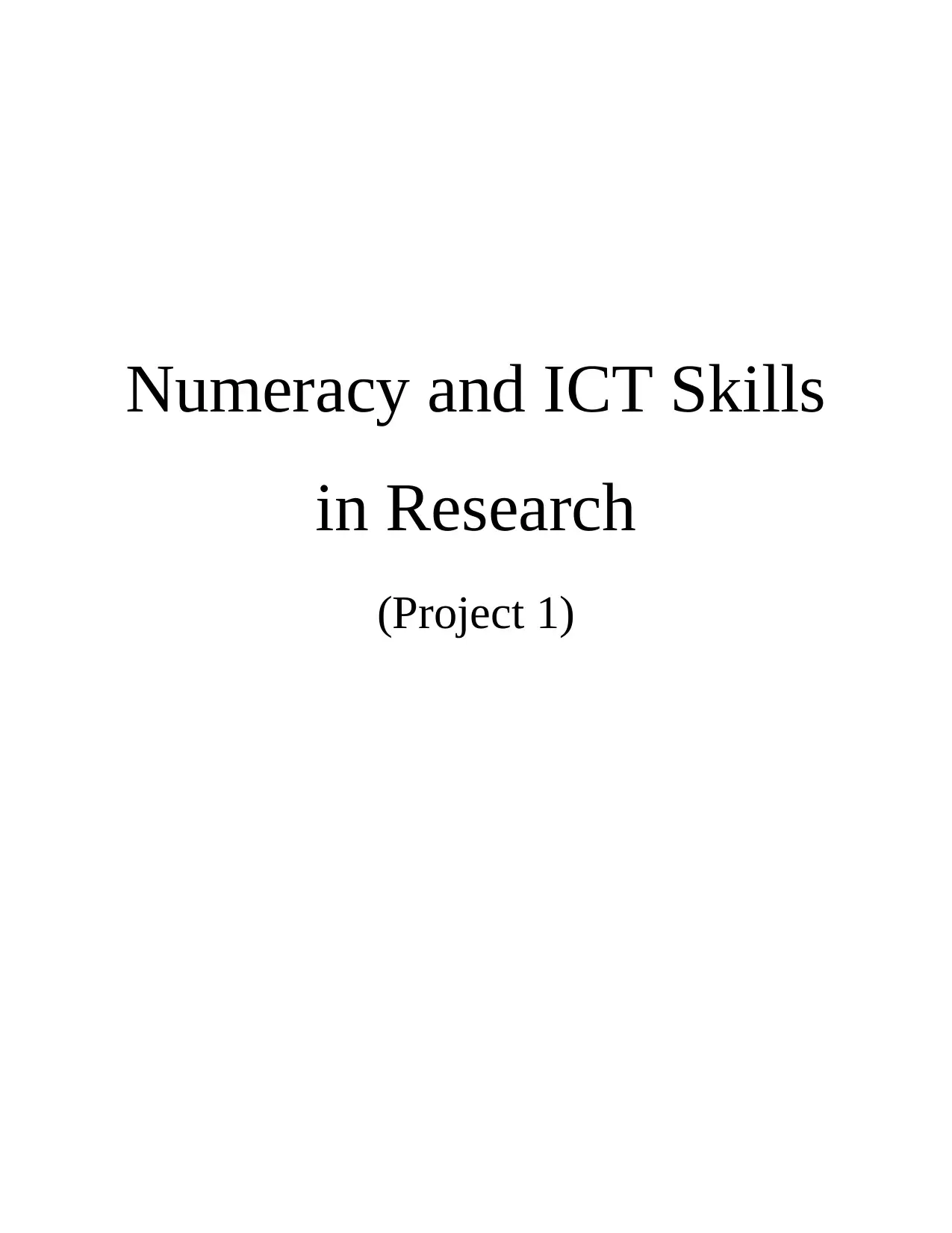
Numeracy and ICT Skills
in Research
(Project 1)
in Research
(Project 1)
Paraphrase This Document
Need a fresh take? Get an instant paraphrase of this document with our AI Paraphraser
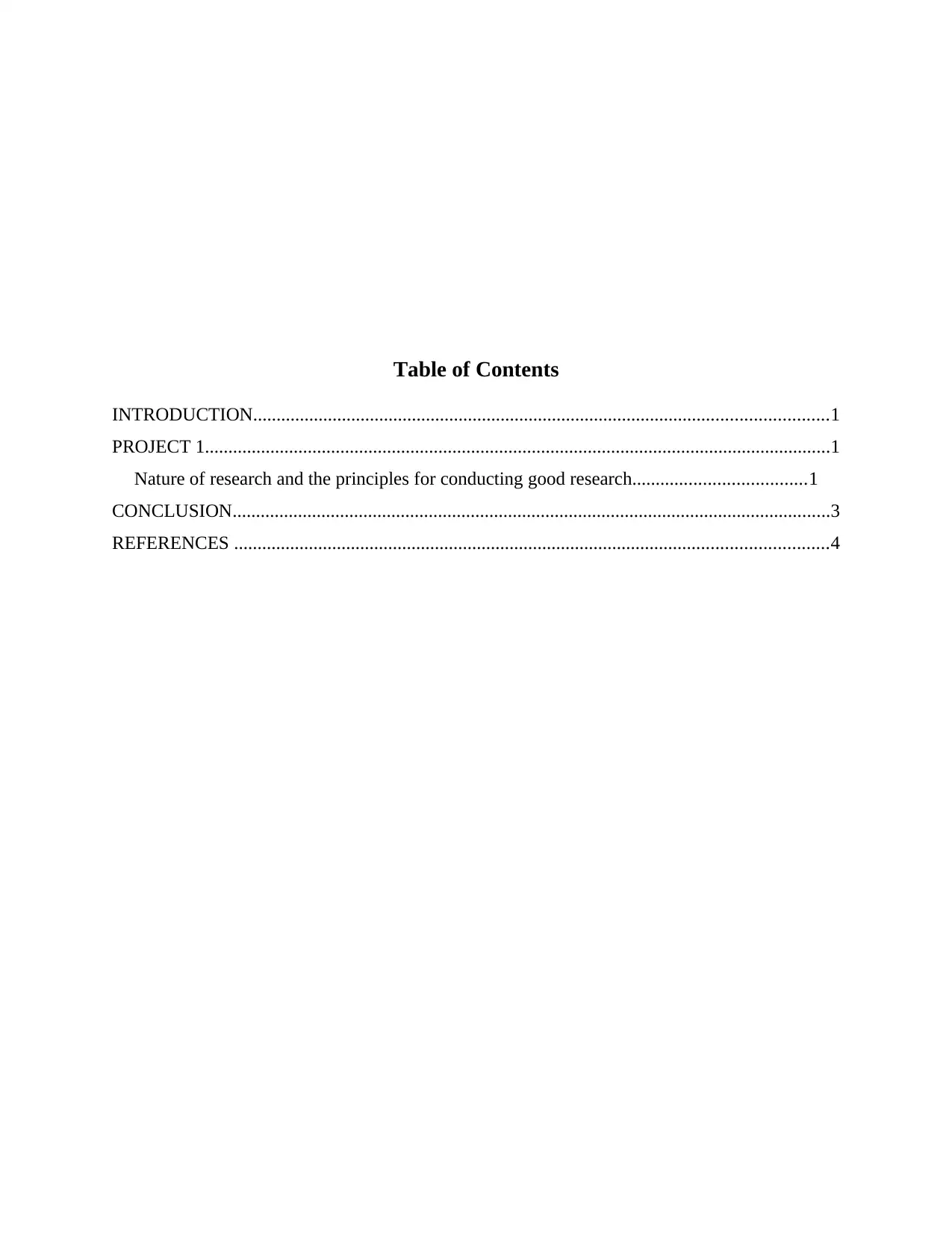
Table of Contents
INTRODUCTION...........................................................................................................................1
PROJECT 1......................................................................................................................................1
Nature of research and the principles for conducting good research.....................................1
CONCLUSION................................................................................................................................3
REFERENCES ...............................................................................................................................4
INTRODUCTION...........................................................................................................................1
PROJECT 1......................................................................................................................................1
Nature of research and the principles for conducting good research.....................................1
CONCLUSION................................................................................................................................3
REFERENCES ...............................................................................................................................4
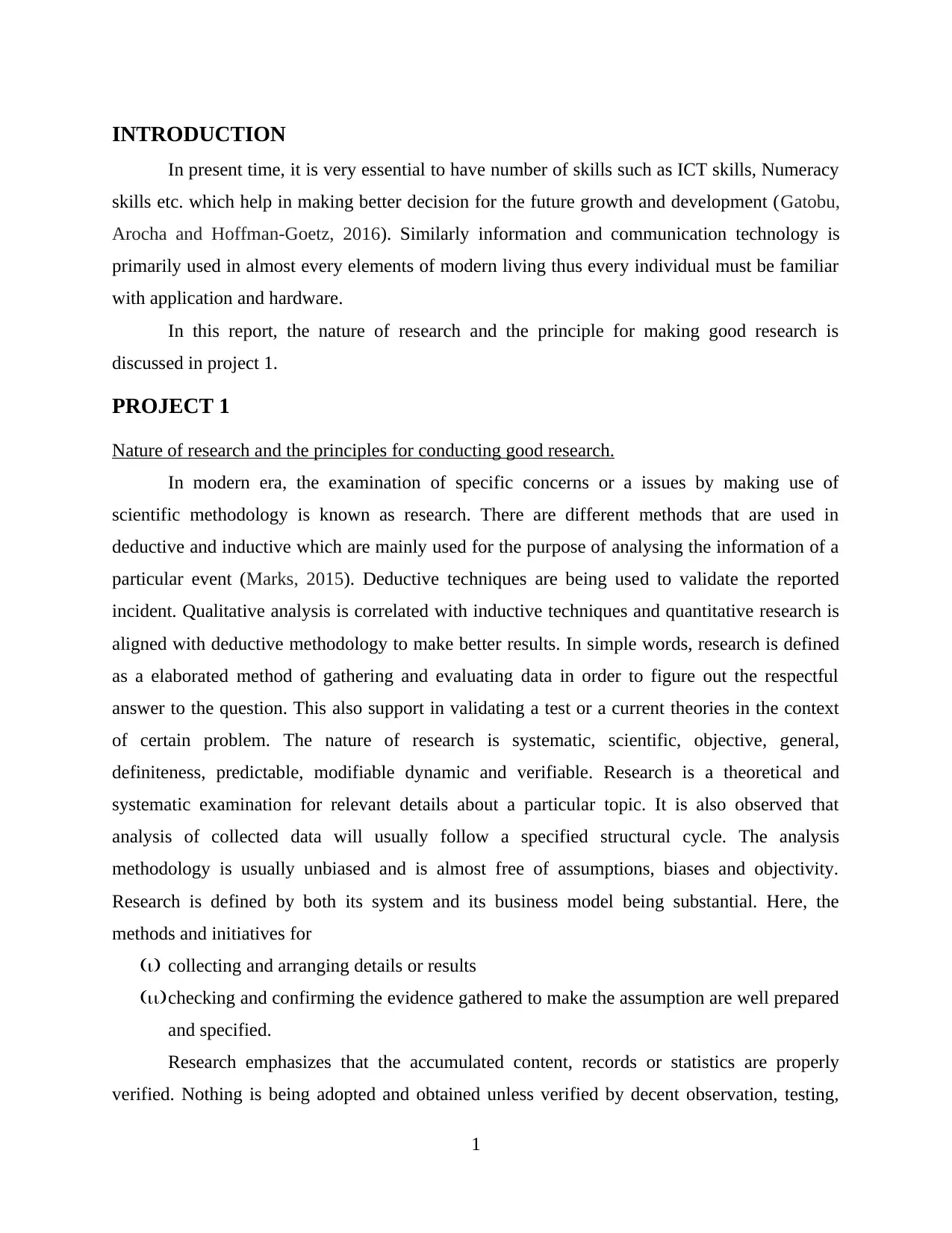
INTRODUCTION
In present time, it is very essential to have number of skills such as ICT skills, Numeracy
skills etc. which help in making better decision for the future growth and development (Gatobu,
Arocha and Hoffman-Goetz, 2016). Similarly information and communication technology is
primarily used in almost every elements of modern living thus every individual must be familiar
with application and hardware.
In this report, the nature of research and the principle for making good research is
discussed in project 1.
PROJECT 1
Nature of research and the principles for conducting good research.
In modern era, the examination of specific concerns or a issues by making use of
scientific methodology is known as research. There are different methods that are used in
deductive and inductive which are mainly used for the purpose of analysing the information of a
particular event (Marks, 2015). Deductive techniques are being used to validate the reported
incident. Qualitative analysis is correlated with inductive techniques and quantitative research is
aligned with deductive methodology to make better results. In simple words, research is defined
as a elaborated method of gathering and evaluating data in order to figure out the respectful
answer to the question. This also support in validating a test or a current theories in the context
of certain problem. The nature of research is systematic, scientific, objective, general,
definiteness, predictable, modifiable dynamic and verifiable. Research is a theoretical and
systematic examination for relevant details about a particular topic. It is also observed that
analysis of collected data will usually follow a specified structural cycle. The analysis
methodology is usually unbiased and is almost free of assumptions, biases and objectivity.
Research is defined by both its system and its business model being substantial. Here, the
methods and initiatives for
(i) collecting and arranging details or results
(ii)checking and confirming the evidence gathered to make the assumption are well prepared
and specified.
Research emphasizes that the accumulated content, records or statistics are properly
verified. Nothing is being adopted and obtained unless verified by decent observation, testing,
1
In present time, it is very essential to have number of skills such as ICT skills, Numeracy
skills etc. which help in making better decision for the future growth and development (Gatobu,
Arocha and Hoffman-Goetz, 2016). Similarly information and communication technology is
primarily used in almost every elements of modern living thus every individual must be familiar
with application and hardware.
In this report, the nature of research and the principle for making good research is
discussed in project 1.
PROJECT 1
Nature of research and the principles for conducting good research.
In modern era, the examination of specific concerns or a issues by making use of
scientific methodology is known as research. There are different methods that are used in
deductive and inductive which are mainly used for the purpose of analysing the information of a
particular event (Marks, 2015). Deductive techniques are being used to validate the reported
incident. Qualitative analysis is correlated with inductive techniques and quantitative research is
aligned with deductive methodology to make better results. In simple words, research is defined
as a elaborated method of gathering and evaluating data in order to figure out the respectful
answer to the question. This also support in validating a test or a current theories in the context
of certain problem. The nature of research is systematic, scientific, objective, general,
definiteness, predictable, modifiable dynamic and verifiable. Research is a theoretical and
systematic examination for relevant details about a particular topic. It is also observed that
analysis of collected data will usually follow a specified structural cycle. The analysis
methodology is usually unbiased and is almost free of assumptions, biases and objectivity.
Research is defined by both its system and its business model being substantial. Here, the
methods and initiatives for
(i) collecting and arranging details or results
(ii)checking and confirming the evidence gathered to make the assumption are well prepared
and specified.
Research emphasizes that the accumulated content, records or statistics are properly
verified. Nothing is being adopted and obtained unless verified by decent observation, testing,
1
⊘ This is a preview!⊘
Do you want full access?
Subscribe today to unlock all pages.

Trusted by 1+ million students worldwide
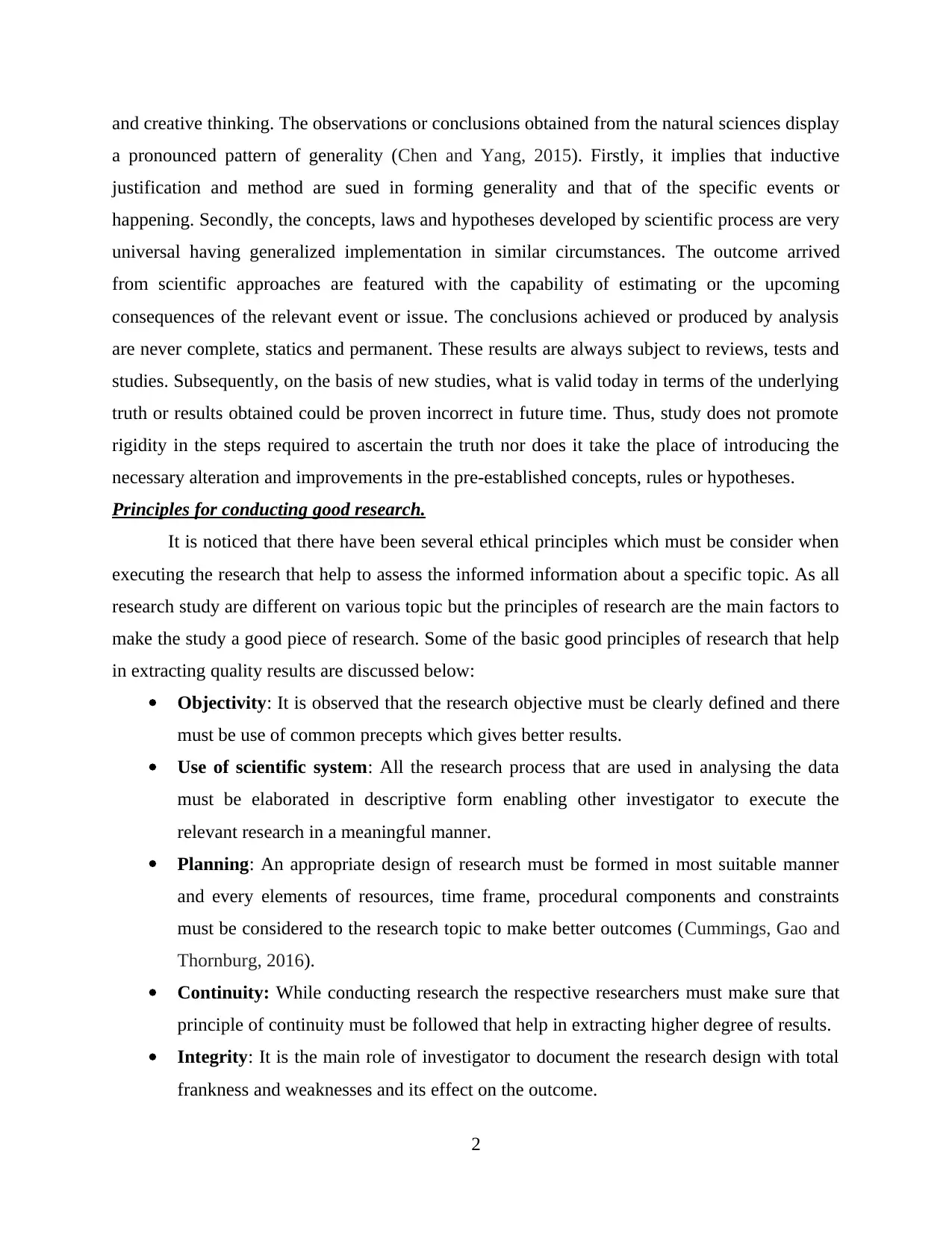
and creative thinking. The observations or conclusions obtained from the natural sciences display
a pronounced pattern of generality (Chen and Yang, 2015). Firstly, it implies that inductive
justification and method are sued in forming generality and that of the specific events or
happening. Secondly, the concepts, laws and hypotheses developed by scientific process are very
universal having generalized implementation in similar circumstances. The outcome arrived
from scientific approaches are featured with the capability of estimating or the upcoming
consequences of the relevant event or issue. The conclusions achieved or produced by analysis
are never complete, statics and permanent. These results are always subject to reviews, tests and
studies. Subsequently, on the basis of new studies, what is valid today in terms of the underlying
truth or results obtained could be proven incorrect in future time. Thus, study does not promote
rigidity in the steps required to ascertain the truth nor does it take the place of introducing the
necessary alteration and improvements in the pre-established concepts, rules or hypotheses.
Principles for conducting good research.
It is noticed that there have been several ethical principles which must be consider when
executing the research that help to assess the informed information about a specific topic. As all
research study are different on various topic but the principles of research are the main factors to
make the study a good piece of research. Some of the basic good principles of research that help
in extracting quality results are discussed below:
Objectivity: It is observed that the research objective must be clearly defined and there
must be use of common precepts which gives better results.
Use of scientific system: All the research process that are used in analysing the data
must be elaborated in descriptive form enabling other investigator to execute the
relevant research in a meaningful manner.
Planning: An appropriate design of research must be formed in most suitable manner
and every elements of resources, time frame, procedural components and constraints
must be considered to the research topic to make better outcomes (Cummings, Gao and
Thornburg, 2016).
Continuity: While conducting research the respective researchers must make sure that
principle of continuity must be followed that help in extracting higher degree of results.
Integrity: It is the main role of investigator to document the research design with total
frankness and weaknesses and its effect on the outcome.
2
a pronounced pattern of generality (Chen and Yang, 2015). Firstly, it implies that inductive
justification and method are sued in forming generality and that of the specific events or
happening. Secondly, the concepts, laws and hypotheses developed by scientific process are very
universal having generalized implementation in similar circumstances. The outcome arrived
from scientific approaches are featured with the capability of estimating or the upcoming
consequences of the relevant event or issue. The conclusions achieved or produced by analysis
are never complete, statics and permanent. These results are always subject to reviews, tests and
studies. Subsequently, on the basis of new studies, what is valid today in terms of the underlying
truth or results obtained could be proven incorrect in future time. Thus, study does not promote
rigidity in the steps required to ascertain the truth nor does it take the place of introducing the
necessary alteration and improvements in the pre-established concepts, rules or hypotheses.
Principles for conducting good research.
It is noticed that there have been several ethical principles which must be consider when
executing the research that help to assess the informed information about a specific topic. As all
research study are different on various topic but the principles of research are the main factors to
make the study a good piece of research. Some of the basic good principles of research that help
in extracting quality results are discussed below:
Objectivity: It is observed that the research objective must be clearly defined and there
must be use of common precepts which gives better results.
Use of scientific system: All the research process that are used in analysing the data
must be elaborated in descriptive form enabling other investigator to execute the
relevant research in a meaningful manner.
Planning: An appropriate design of research must be formed in most suitable manner
and every elements of resources, time frame, procedural components and constraints
must be considered to the research topic to make better outcomes (Cummings, Gao and
Thornburg, 2016).
Continuity: While conducting research the respective researchers must make sure that
principle of continuity must be followed that help in extracting higher degree of results.
Integrity: It is the main role of investigator to document the research design with total
frankness and weaknesses and its effect on the outcome.
2
Paraphrase This Document
Need a fresh take? Get an instant paraphrase of this document with our AI Paraphraser
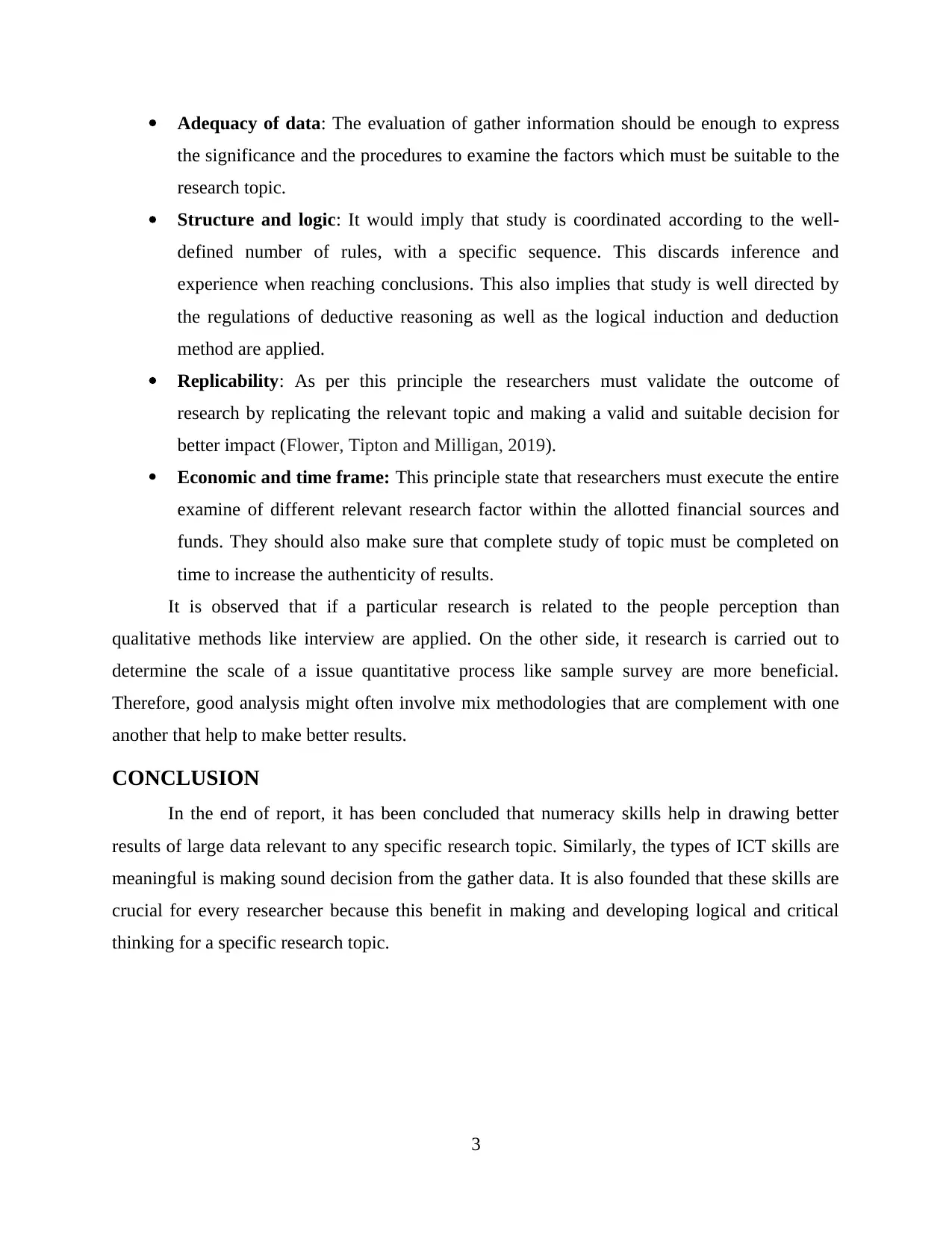
Adequacy of data: The evaluation of gather information should be enough to express
the significance and the procedures to examine the factors which must be suitable to the
research topic.
Structure and logic: It would imply that study is coordinated according to the well-
defined number of rules, with a specific sequence. This discards inference and
experience when reaching conclusions. This also implies that study is well directed by
the regulations of deductive reasoning as well as the logical induction and deduction
method are applied.
Replicability: As per this principle the researchers must validate the outcome of
research by replicating the relevant topic and making a valid and suitable decision for
better impact (Flower, Tipton and Milligan, 2019).
Economic and time frame: This principle state that researchers must execute the entire
examine of different relevant research factor within the allotted financial sources and
funds. They should also make sure that complete study of topic must be completed on
time to increase the authenticity of results.
It is observed that if a particular research is related to the people perception than
qualitative methods like interview are applied. On the other side, it research is carried out to
determine the scale of a issue quantitative process like sample survey are more beneficial.
Therefore, good analysis might often involve mix methodologies that are complement with one
another that help to make better results.
CONCLUSION
In the end of report, it has been concluded that numeracy skills help in drawing better
results of large data relevant to any specific research topic. Similarly, the types of ICT skills are
meaningful is making sound decision from the gather data. It is also founded that these skills are
crucial for every researcher because this benefit in making and developing logical and critical
thinking for a specific research topic.
3
the significance and the procedures to examine the factors which must be suitable to the
research topic.
Structure and logic: It would imply that study is coordinated according to the well-
defined number of rules, with a specific sequence. This discards inference and
experience when reaching conclusions. This also implies that study is well directed by
the regulations of deductive reasoning as well as the logical induction and deduction
method are applied.
Replicability: As per this principle the researchers must validate the outcome of
research by replicating the relevant topic and making a valid and suitable decision for
better impact (Flower, Tipton and Milligan, 2019).
Economic and time frame: This principle state that researchers must execute the entire
examine of different relevant research factor within the allotted financial sources and
funds. They should also make sure that complete study of topic must be completed on
time to increase the authenticity of results.
It is observed that if a particular research is related to the people perception than
qualitative methods like interview are applied. On the other side, it research is carried out to
determine the scale of a issue quantitative process like sample survey are more beneficial.
Therefore, good analysis might often involve mix methodologies that are complement with one
another that help to make better results.
CONCLUSION
In the end of report, it has been concluded that numeracy skills help in drawing better
results of large data relevant to any specific research topic. Similarly, the types of ICT skills are
meaningful is making sound decision from the gather data. It is also founded that these skills are
crucial for every researcher because this benefit in making and developing logical and critical
thinking for a specific research topic.
3
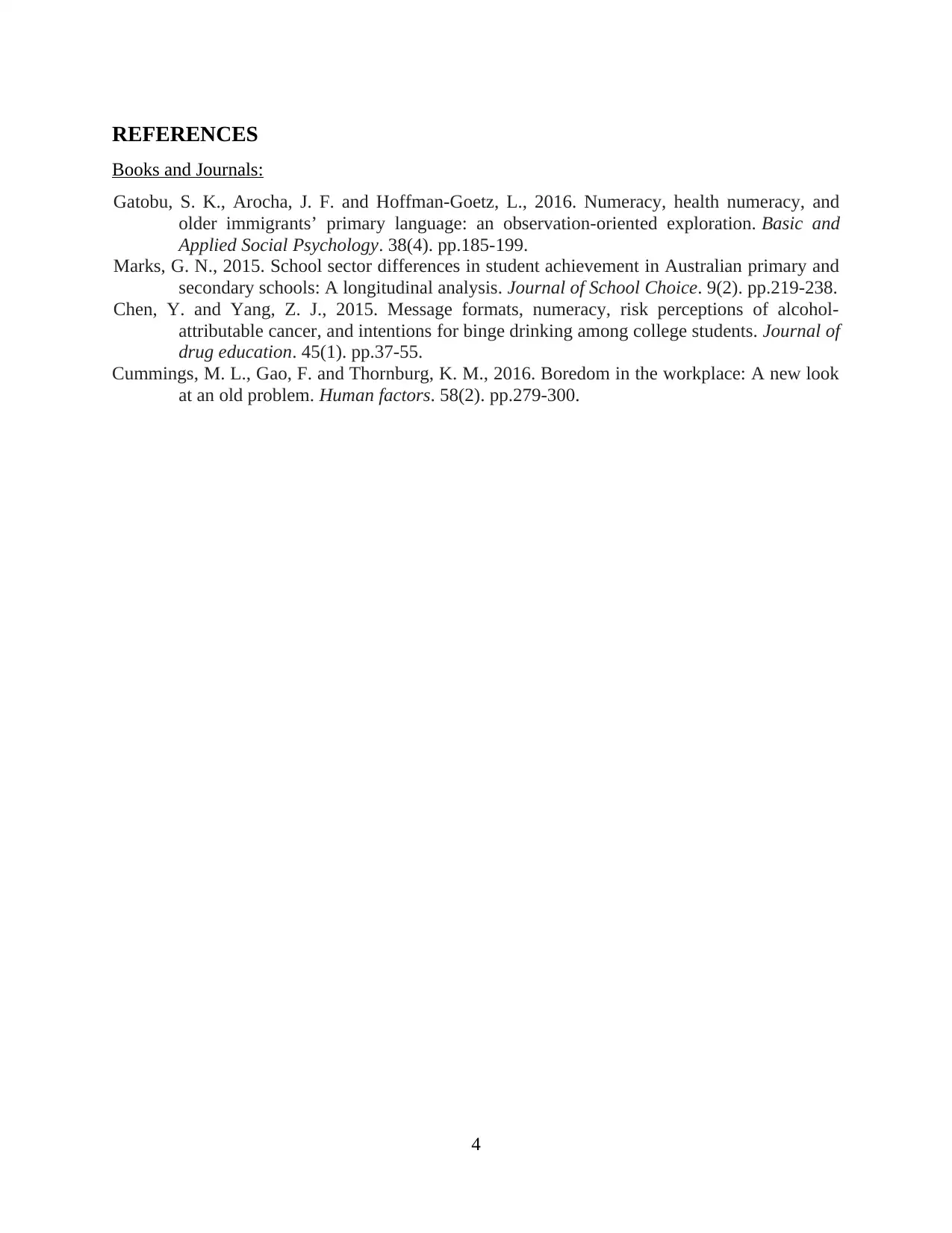
REFERENCES
Books and Journals:
Gatobu, S. K., Arocha, J. F. and Hoffman-Goetz, L., 2016. Numeracy, health numeracy, and
older immigrants’ primary language: an observation-oriented exploration. Basic and
Applied Social Psychology. 38(4). pp.185-199.
Marks, G. N., 2015. School sector differences in student achievement in Australian primary and
secondary schools: A longitudinal analysis. Journal of School Choice. 9(2). pp.219-238.
Chen, Y. and Yang, Z. J., 2015. Message formats, numeracy, risk perceptions of alcohol-
attributable cancer, and intentions for binge drinking among college students. Journal of
drug education. 45(1). pp.37-55.
Cummings, M. L., Gao, F. and Thornburg, K. M., 2016. Boredom in the workplace: A new look
at an old problem. Human factors. 58(2). pp.279-300.
4
Books and Journals:
Gatobu, S. K., Arocha, J. F. and Hoffman-Goetz, L., 2016. Numeracy, health numeracy, and
older immigrants’ primary language: an observation-oriented exploration. Basic and
Applied Social Psychology. 38(4). pp.185-199.
Marks, G. N., 2015. School sector differences in student achievement in Australian primary and
secondary schools: A longitudinal analysis. Journal of School Choice. 9(2). pp.219-238.
Chen, Y. and Yang, Z. J., 2015. Message formats, numeracy, risk perceptions of alcohol-
attributable cancer, and intentions for binge drinking among college students. Journal of
drug education. 45(1). pp.37-55.
Cummings, M. L., Gao, F. and Thornburg, K. M., 2016. Boredom in the workplace: A new look
at an old problem. Human factors. 58(2). pp.279-300.
4
⊘ This is a preview!⊘
Do you want full access?
Subscribe today to unlock all pages.

Trusted by 1+ million students worldwide
1 out of 6
Related Documents
Your All-in-One AI-Powered Toolkit for Academic Success.
+13062052269
info@desklib.com
Available 24*7 on WhatsApp / Email
![[object Object]](/_next/static/media/star-bottom.7253800d.svg)
Unlock your academic potential
Copyright © 2020–2026 A2Z Services. All Rights Reserved. Developed and managed by ZUCOL.





